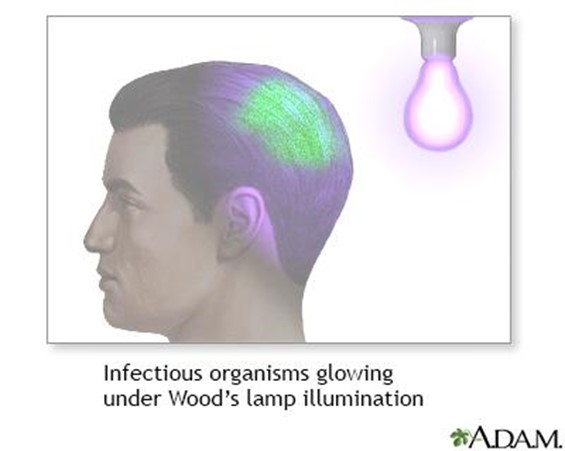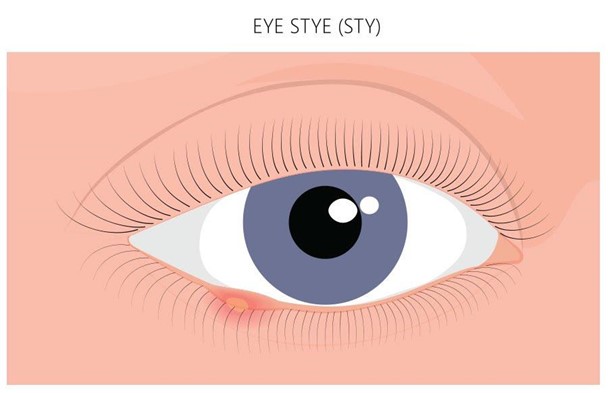The physician suspects a client has a dermatological infection. Which of the following diagnostics will be ordered to observe color changes to the skin using an ultraviolet light source?
Culture
KOH
Diascopy
Wood's
The Correct Answer is D
Choice A Reason: Culture is not a diagnostic test that uses an ultraviolet light source, but a laboratory test that involves growing microorganisms from a sample of body fluid or tissue. Culture can help identify the type and sensitivity of the infection-causing agent.
Choice B Reason: KOH is not a diagnostic test that uses an ultraviolet light source, but a chemical test that involves applying potassium hydroxide to a sample of skin, hair, or nail. KOH can help diagnose fungal infections by dissolving the keratin and revealing the fungal elements under a microscope.
Choice C Reason: Diascopy is not a diagnostic test that uses an ultraviolet light source, but a physical test that involves applying pressure to a lesion with a glass slide or lens. Diascopy can help differentiate between blanchable and non-blanchable lesions, such as erythema or petechiae.
Choice D Reason: Wood's is a diagnostic test that uses an ultraviolet light source, also known as a Wood's lamp or black light. Wood's can help observe color changes to the skin that are not visible under normal light, such as fluorescence or hypopigmentation. Wood's can help diagnose conditions such as tinea capitis, vitiligo, or erythrasma.

Nursing Test Bank
Naxlex Comprehensive Predictor Exams
Related Questions
Correct Answer is B
Explanation
Choice A Reason: An antifungal cream is not indicated for a sty, which is an infection of the eyelash follicle or sebaceous gland caused by bacteria.
Choice B Reason: This is the correct answer because warm compresses can help relieve pain and inflammation, and promote drainage of the sty.
Choice C Reason: Ice and cold compresses are not recommended for a sty, as they can constrict blood vessels and delay healing.
Choice D Reason: There is no need to test the other eye for vision loss, as a sty does not affect vision unless it is very large or obstructs the pupil.

Correct Answer is A
Explanation
Choice A reason: This is correct because resuming a functional role in society is the ultimate goal for a client in the rehabilitative phase of a burn injury. The rehabilitative phase begins when wound healing is complete and lasts until physical and psychosocial recovery is achieved. The nurse should help the client regain independence, self-esteem, and quality of life by providing education, counseling, referrals, and resources.
Choice B reason: This is incorrect because pain management is not a goal, but an intervention for a client in the rehabilitative phase of a burn injury. Pain management is important throughout all phases of burn care, but especially during wound healing and scar formation, which can cause itching, tightness, or hypersensitivity. The nurse should assess the client's pain level and administer analgesics, antipruritics, or moisturizers as ordered.
Choice C reason: This is incorrect because providing continued full support to the client is not a goal, but an intervention for a client in the rehabilitative phase of a burn injury. Providing continued full support to the client can help them cope with physical and emotional challenges, such as scarring, disfigurement, disability, or depression. The nurse should provide emotional support, active listening, positive feedback, and encouragement to the client.
Choice D reason: This is incorrect because preventing infection is not a goal, but an intervention for a client in the rehabilitative phase of a burn injury. Preventing infection is crucial during wound healing and grafting, which can be compromised by bacterial colonization or contamination. The nurse should monitor the client's vital signs, wound appearance, and laboratory results, and administer antibiotics or antiseptics as ordered.
Whether you are a student looking to ace your exams or a practicing nurse seeking to enhance your expertise , our nursing education contents will empower you with the confidence and competence to make a difference in the lives of patients and become a respected leader in the healthcare field.
Visit Naxlex, invest in your future and unlock endless possibilities with our unparalleled nursing education contents today
Report Wrong Answer on the Current Question
Do you disagree with the answer? If yes, what is your expected answer? Explain.
Kindly be descriptive with the issue you are facing.
